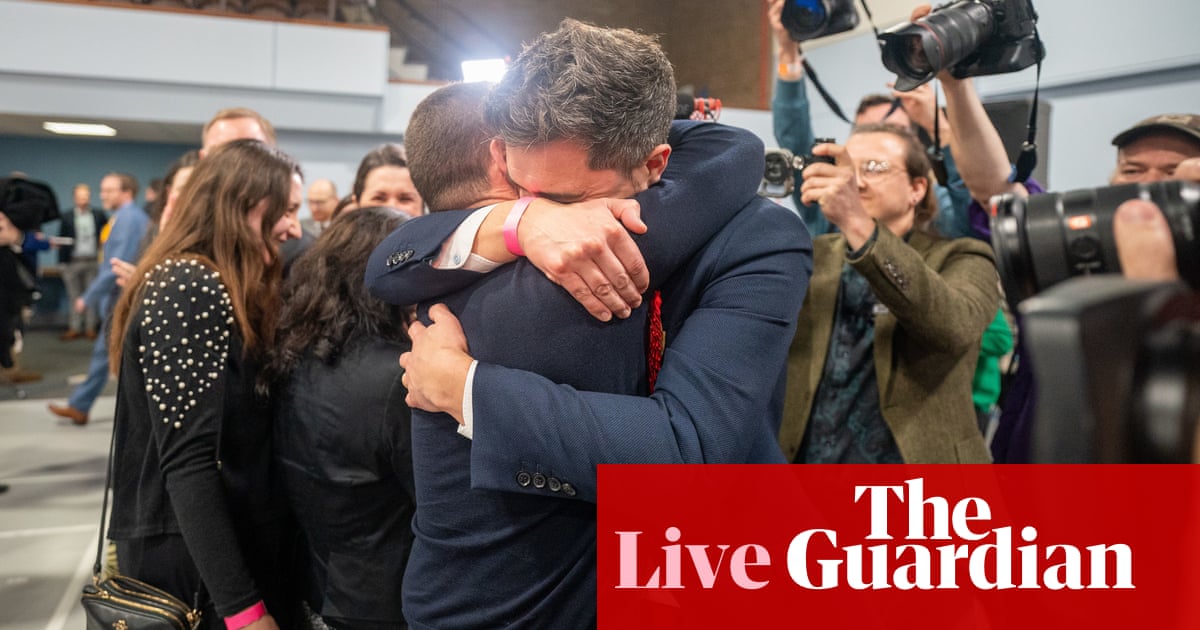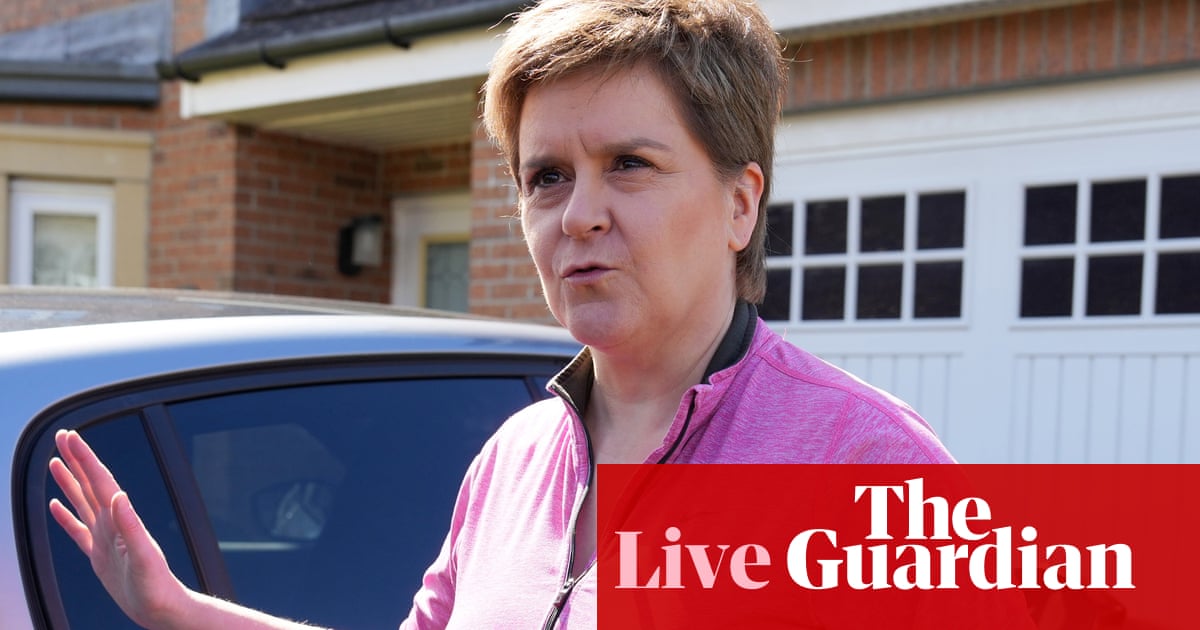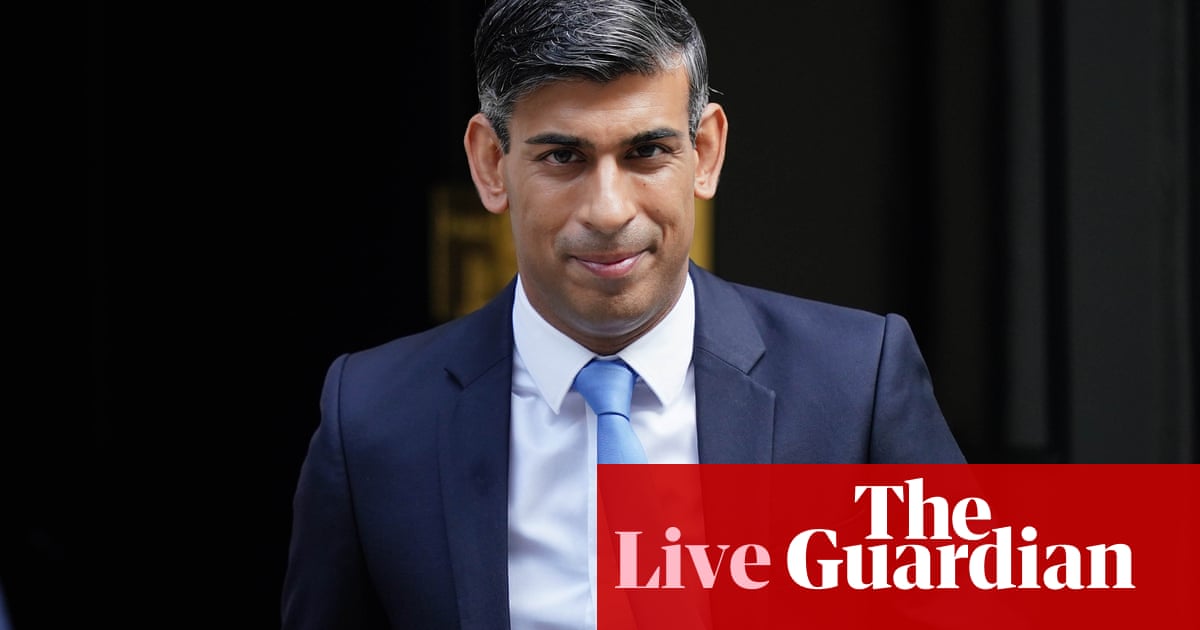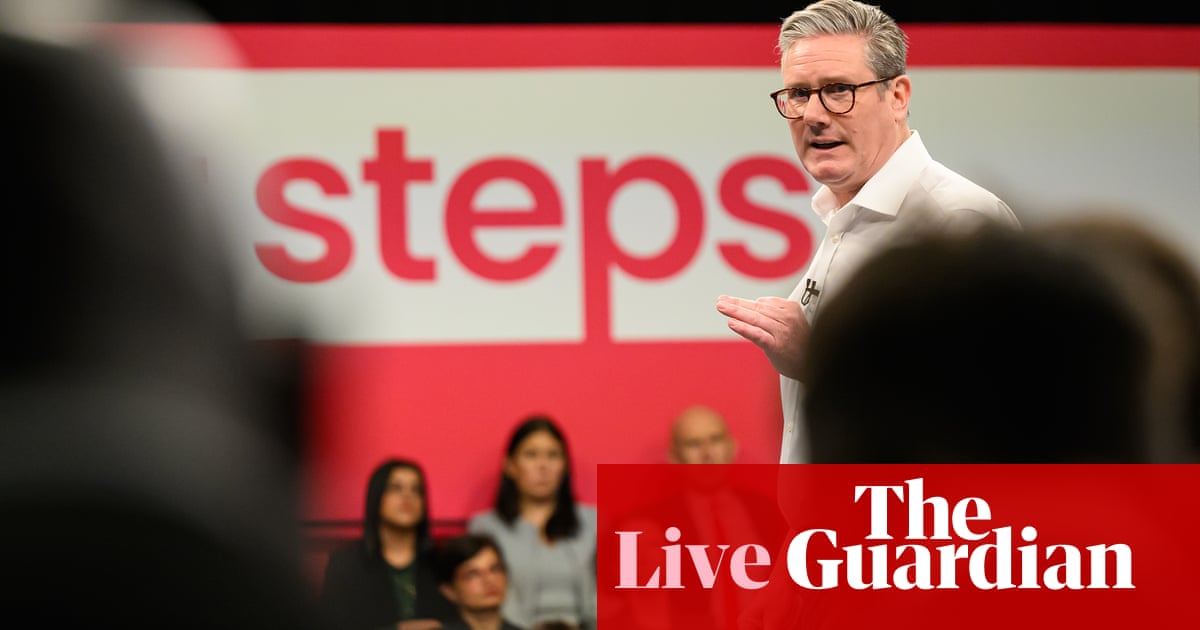
DWP minister claims winter fuel allowance cuts could eventually reduce pensioner poverty, by raising benefit take-up
Stephen Timms, a welfare minister, has said that over time the winter fuel payment cuts could actually reduce pensioner poverty, because it is encouraging pensioners to claim pension credit.
Speaking an an interview with Radio 4’s World at One, broadcast after Labour delegates voted for a motion saying the cut should be reversed, Timms, the minister for social security and disability, said:
The chancellor has made decisions which need to be made to sort out the very serious problems in the government finances which we’ve been left with.
And I’m hoping that, over time, this measure will actually reduce pensioner poverty by increasing the take-up of pension credit.
We have seen quite a big boost in the number of people applying for pension credit over the last few weeks, and I think that is likely to continue.
The only pensioners who will continue to get the winter fuel payment, which can be worth up to £300 per household, are pensioners on pension credit, a benefit paid to those with the lowest incomes.
According to the latest government figures, only 63% of pensioners who are eligible for pension credit claim it. The government said earlier this month up to 880,000 pensioners could be missing out, and it has launched a campaign to encourage them to claim. Three weeks ago the government said applications were up 115%.
But a DWP equality impact assessment published on 13 September said that the department expected take-up to rise by just 5 percentage points. It said:
Out of the total c.10m who will lose out in the 1st year of the policy, we estimate that around 880k of these will be pensioners who would be entitled to pension credit if they claimed it, but have not done so. The modelling underpinning the policy costing assumes a 5 percentage point “loss aversion” increase in PC take-up (from 63% to 68%), reducing this to around 780k and increasing the PC caseload by around 100k.
The Joseph Rowntree Foundation, a thinktank focusing on poverty, has said that means-testing the winter fuel payment, in the way that the government is doing, could push an extra 100,000 pensioners into poverty.
According to an analysis by Steve Webb, a former Lib Dem pensions minister, for Lane Clark and Peacock, pensions consultants, there are about 1.9 million pensioners living in relative povery. Only about 300,000 of them are getting pension credit. Of the other 1.6m, only around half of them might be eligible for pension credit, he says. He says the other 800,000 do not qualify for pension credit, but pushed below the poverty level by housing costs.
If all pensioners eligible for pension credit were to claim it, the government would not save any money from the winter fuel payment cut. Rachel Reeves, the chancellor, has claimed she would not mind this outome, because it would mean poorer pensioners were benefiting.
Afternoon summary
Keir Starmer has told Russia he does not know how it can show its face at the United Nations after invading Ukraine and treating its own citizens as “bits of meat to fling into the grinder”.
The Labour leadership has lost a highly anticipated motion at the party’s conference that called on ministers to reverse the cuts to winter fuel payments. Reacting to the defeat, Starmer said it would not decide policy. He told Channel 4 News:
I do understand how, you know, colleagues in the Labour movement feel about this.
This is clearly a difficult decision but a motion at conference doesn’t dictate government policy.
Stephen Timms, a welfare minister, has said that over time the winter fuel payment cuts could actually reduce pensioner poverty, because it is encouraging pensioners to claim pension credit. (See 2.25pm.)
People who have been on long-term sickness leave and claiming benefits will need get back into the workplace “where they can”, Starmer has said.
Starmer has said he wants to meet Kamala Harris and Donald Trump before the US election, as he declined to back one of his ministers who said the Republican candidate had contributed to racist rhetoric in the UK.
Tories accuse Starmer of being "addicted to luxury" in fresh attack on his record accepting donations
In interviews today Keir Starmer has for the first time given a detailed explanation as to why he chose to accept an accommodation donation worth £20,000 around the time of the general election. (See 9.49am.)
But if he expected the opposition to accept his explanation and let go of the story, he’ll be disappointed. The Conservative party has just issued a fresh attack on Starmer over this, in the form of a statement from Kevin Hollinrake, the shadow business secretary. He said:
This row isn’t about the preferential treatment he has given his child during their education, whilst taxing the schooling of thousands of others; nor is it about him and his wife being lavished with designer clothes whilst pensioners face the choice between heating and eating this winter.
This is about Keir Starmer, and his top team, thinking the rules don’t apply to them. They have become utterly addicted to luxury clothing, holidays and services provided by their mega donor whilst expecting everyone else to tighten their belt. Why does he always think he’s a special case?
Labour promised to be a government of service but all they’ve offered is a government of self-service.
80% of people think politicians should not be allowed to accept gifts like clothes and tickets, poll suggests
According to polling by YouGov, 80% of Britons do not think politicians should be allowed to accept gifts like clothes or concert tickets.
That figure includes 29% of people who think that it was acceptable for politicians like Keir Starmer to have accepted donations like this, because that was within the rules, but that the rules should be changed to stop this; and 51% who said accepting gifts should be banned, and that even knowing the rules allowed it, it was wrong for the politicians who did accept gifts to do so.
The Labour MP Rosie Duffield has posted a message on X welcoming the conference vote calling for the winter fuel payments cut to be reversed.
I‘m glad that Labour Party Conference and @CWUnews have voted to keep #WinterFuelAllowance. Our Party was created to protect the most vulnerable, and today it has determined that it must never step back from that mandate. I trust the Govt can now keep our pensioners safe & warm.
Another Labour MP, Rachael Maskell, has posted a message on her account with the same wording.
Starmer urges Britons in Lebanon to leave immediately
Keir Starmer has arrived at the UN general assembly where he will have various meetings on the Middle East and Ukraine, before making a speech later.
Asked for his message to Britons in Lebanon, he said they should not wait to be evacuated at a later date and should “leave and leave immediately” via commercial flights.
He said:
I am very worried about the escalation. I’m calling for all parties to step back from the brink, to de-escalate. We need a ceasefire so this can be sorted out diplomatically.
But I have a very important message for British nationals in Lebanon which is: the time to leave is now.
The contingency plans are being ramped up but don’t wait for those, there are still commercial flights. It’s very important that they hear my message, which is to leave and to leave immediately.
Michael Gove named as Spectator editor after GB News backer’s takeover
Michael Gove, the former cabinet minister and one of the leaders of the Vote Leave Brexit campaign, has been named as the new editor of the Spectator magazine, weeks after the GB News backer Sir Paul Marshall completed a £100m takeover of the politically right-leaning magazine, Mark Sweney reports.
DWP minister claims winter fuel allowance cuts could eventually reduce pensioner poverty, by raising benefit take-up
Stephen Timms, a welfare minister, has said that over time the winter fuel payment cuts could actually reduce pensioner poverty, because it is encouraging pensioners to claim pension credit.
Speaking an an interview with Radio 4’s World at One, broadcast after Labour delegates voted for a motion saying the cut should be reversed, Timms, the minister for social security and disability, said:
The chancellor has made decisions which need to be made to sort out the very serious problems in the government finances which we’ve been left with.
And I’m hoping that, over time, this measure will actually reduce pensioner poverty by increasing the take-up of pension credit.
We have seen quite a big boost in the number of people applying for pension credit over the last few weeks, and I think that is likely to continue.
The only pensioners who will continue to get the winter fuel payment, which can be worth up to £300 per household, are pensioners on pension credit, a benefit paid to those with the lowest incomes.
According to the latest government figures, only 63% of pensioners who are eligible for pension credit claim it. The government said earlier this month up to 880,000 pensioners could be missing out, and it has launched a campaign to encourage them to claim. Three weeks ago the government said applications were up 115%.
But a DWP equality impact assessment published on 13 September said that the department expected take-up to rise by just 5 percentage points. It said:
Out of the total c.10m who will lose out in the 1st year of the policy, we estimate that around 880k of these will be pensioners who would be entitled to pension credit if they claimed it, but have not done so. The modelling underpinning the policy costing assumes a 5 percentage point “loss aversion” increase in PC take-up (from 63% to 68%), reducing this to around 780k and increasing the PC caseload by around 100k.
The Joseph Rowntree Foundation, a thinktank focusing on poverty, has said that means-testing the winter fuel payment, in the way that the government is doing, could push an extra 100,000 pensioners into poverty.
According to an analysis by Steve Webb, a former Lib Dem pensions minister, for Lane Clark and Peacock, pensions consultants, there are about 1.9 million pensioners living in relative povery. Only about 300,000 of them are getting pension credit. Of the other 1.6m, only around half of them might be eligible for pension credit, he says. He says the other 800,000 do not qualify for pension credit, but pushed below the poverty level by housing costs.
If all pensioners eligible for pension credit were to claim it, the government would not save any money from the winter fuel payment cut. Rachel Reeves, the chancellor, has claimed she would not mind this outome, because it would mean poorer pensioners were benefiting.
Green party backs Unite"s call for wealth tax as alternative to winter fuel payments cut
The Green party says it backs Unite’s call for the government to impose a wealth tax as an alternative to cutting the winter fuel payment. (See 11.21am.) In a statement following the Labour conference vote against the cut, Carla Denyer, the Green party’s co-leader, said:
Today’s vote at Labour party conference leaves Labour ministers out in the cold. There is a groundswell of support - from opposition parties, unions, many Labour MPs, health workers, disability groups, charities supporting pensioners, as well as others - for ensuring millions of pensioners keep warm this winter.
Targeting some of the most vulnerable to fix the supposed black hole in the public finances is cruel and unnecessary.
There is another way. A fairer way. As the successful motion by Unite makes clear, taxing multi-millionaires and billionaires a little more would not only easily cover the cost of winter fuel payments for all pensioners but also generate additional funds for much needed investment in our health and social care services.
Bridget Phillipson, the education secretary, confirmed that extra childcare places in new school-based nurseries in England will be available to families from next year in her conference speech.
As PA Media reports, working parents of all children older than nine months are now able to access 15 hours of funded childcare, before the full roll-out of 30 hours a week to all eligible families in September 2025.
In its manifesto, Labour said it would open an additional 3,000 nurseries through “upgrading space” in primary schools, to deliver the extension of government-funded hours families are entitled to.
Phillipson told the Labour conference:
Today I can tell you that change begins, delivery begins: those extra places start opening next year. The first phase of our new nurseries, of high-quality early education, boosting life chances for children and work choices for parents.
From next month, schools will be invited to bid for a share of £15m capital funding, with capacity in the programme to deliver up to 300 new or expanded nurseries in this first round.
Sunak and Hunt claim OECD growth forecasts show Tories left "strong economic inheritance"
As Phillip Inman reports, the Organisation for Economic Cooperation and Development (OECD) has significantly increased its growth forecast for 2024. He explains:
Describing the UK’s economic growth as “robust”, the OECD upgraded its growth for 2024 to 1.1% from a forecast of 0.4% made in May, as the country recovers from a mild recession at the end of last year. The forecast of 1.2% growth in 2025 was maintained.
In the May forecast, the UK was behind all other nations in the informal bloc but is now expected to outpace Japan, Italy and struggling Germany. Britain is now on par with Canada and France but behind the US.
Rishi Sunak, the former PM, and Jeremy Hunt, the former chancellor, have both been posting about this on X. They dispute Labour’s claim that the Conservatives left the economy in a poor state, and they argue that these figures show they left the economy in a strong state.
This is from Sunak.
Labour inherited the fastest growing economy in the G7.
But the Prime Minister and Chancellor constantly talking the economy down has already had a damaging impact on consumer and business confidence.
Time to stop playing politics and put country first, party second.
And this is from Hunt.
The OECD data today yet again shows that Labour were left a strong economic inheritance, despite their desperation to say otherwise. The Chancellor’s choices at the Budget will be hers and hers alone.
The OECD figures are about the state of the economy generally. Labour’s main complaint about the Tories has been about the state of the public finances (and the £22bn gap it claims to have found between what the Tories were planning to spend this year, and the money they had to fund this), although Labour also argues the economy has been underperforming for years.
Stephen Flynn, the SNP leader at Westminster, has said that Keir Starmer should listen to his party conference and reverse the winter fuel payments cut. In a statement after the Labour conference vote, he said:
Keir Starmer must finally listen to voters, admit he got it wrong, and U-turn on the Labour government’s damaging cuts to the winter fuel payment for millions of pensioners.
The fact that the prime minister’s own party members feel obliged to speak out, and demand he reverse these cuts, should tell him just how angry voters are at his cuts.
Ellie Reeves, a Cabinet Office minister and the Labour party chair, has just closed the speech with a speech quoting John Smith, saying all Labour asks is the chance the serve.
The British people have given us that chance. We will not let them down.
Bridget Phillipson, the education secretary, told the conference in her speech earlier that Labour would bring in “a new era of child-centred government — building a country where children come first”.
Explaining what this meant, a Labour briefing said:
Labour’s child-centred approach will focus on breaking down barriers to opportunity beyond the school gates, as well as those in the classroom, including mental ill health and child poverty through measures such as additional mental health counselling support in schools and developing a comprehensive child poverty strategy through the Child Poverty Taskforce. Labour will publish the Children’s Wellbeing Bill in the coming months, which will put children and their wellbeing at the centre of the education and children’s social care systems, and make changes to ensure children are safe, healthy, happy and treated fairly.












